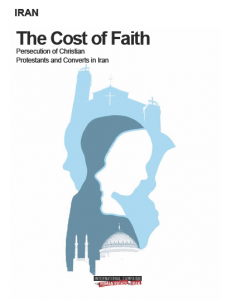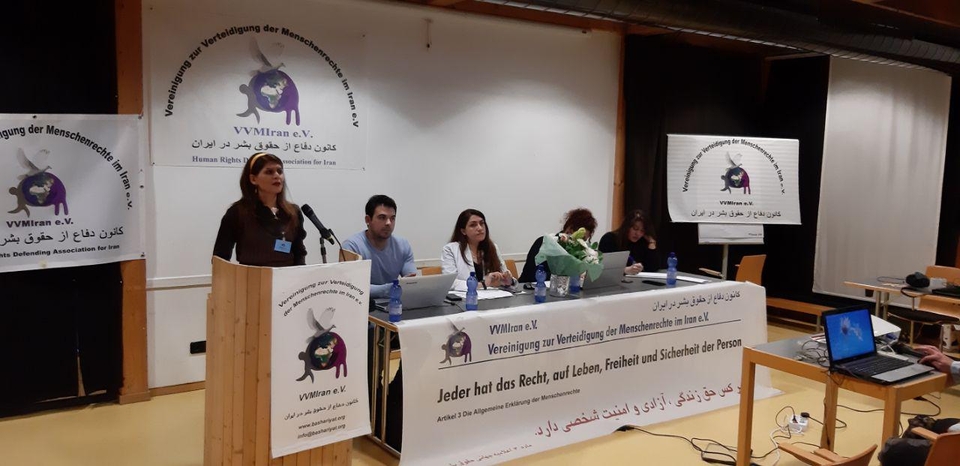Let’s continue our effort till abolishment of issue an execution order Continue reading
Oct 26
Announcement 413
Basic 3 international declarations of human rights
Every man right to exist, freedom and personal security Continue reading
Sep 18
Nasrin Sotoudeh, Iranian defender of human rights
Lawyer Nasrin Sotoudeh, freed Wednesday after three years in prison, is a leading Iranian defender of human rights who was jailed for her work with Nobel peace laureate Shirin Ebadi.
Hailing from a religious middle class family, the mother of two was among the few lawyers to take on high profile human rights and political cases in Iran before her arrest in 2010.
She told AFP by phone from her home shortly after her release that she was in good physical and psychological condition and promised to “definitely” continue her human rights work. Continue reading
May 02
“The egregious violations of Christians’
rights, which include not only the inability to freely practice their religion, but also the threat of torture and death at the hands of state officials, go against all international law. The international community must let the Iranian government know this is unacceptable,” said Hadi Ghaemi, Executive Director for the Campaign. Continue reading
Apr 10
10 December 1948
PREAMBLE
Whereas recognition of the inherent dignity and of the equal and inalienable rights of all members of the human family is the foundation of freedom, justice and peace in the world,
Whereas disregard and contempt for human rights have resulted in barbarous acts which have outraged the conscience of mankind, and the advent of a world in which human beings shall enjoy freedom of speech and belief and freedom from fear and want has been proclaimed as the highest aspiration of the common people,
Whereas it is essential, if man is not to be compelled to have recourse, as a last resort, to rebellion against tyranny and oppression, that human rights should be protected by the rule of law,
Whereas it is essential to promote the development of friendly relations between nations,
Whereas the peoples of the United Nations have in the Charter reaffirmed their faith in fundamental human rights, in the dignity and worth of the human person and in the equal rights of men and women and have determined to promote social progress and better standards of life in larger freedom,
Whereas Member States have pledged themselves to achieve, in co-operation with the United Nations, the promotion of universal respect for and observance of human rights and fundamental freedoms,
Whereas a common understanding of these rights and freedoms is of the greatest importance for the full realization of this pledge,
Now, Therefore THE GENERAL ASSEMBLY proclaims THIS UNIVERSAL DECLARATION OF HUMAN RIGHTS as a common standard of achievement for all peoples and all nations, to the end that every individual and every organ of society, keeping this Declaration constantly in mind, shall strive by teaching and education to promote respect for these rights and freedoms and by progressive measures, national and international, to secure their universal and effective recognition and observance, both among the peoples of Member States themselves and among the peoples of territories under their jurisdiction.
Apr 10
United Nations was signed on 26 June 1945
INTRODUCTORY NOTE
The Charter of the United Nations was signed on 26 June 1945, in San Francisco, at the conclusion of the United Nations Conference on International Organization, and came into force on 24 October 1945. The Statute of the International Court of Justice is an integral part of the Charter.
Amendments to Articles 23, 27 and 61 of the Charter were adopted by the General Assembly on 17 December 1963 and came into force on 31 August 1965. A further amendment to Article 61 was adopted by the General Assembly on 20 December 1971, and came into force on 24 September 1973. An amendment to Article 109, adopted by the General Assembly on 20 December 1965, came into force on 12 June 1968.
The amendment to Article 23 enlarges the membership of the Security Council from eleven to fifteen. The amended Article 27 provides that decisions of the Security Council on procedural matters shall be made by an affirmative vote of nine members (formerly seven) and on all other matters by an affirmative vote of nine members (formerly seven), including the concurring votes of the five permanent members of the Security Council.
The amendment to Article 61, which entered into force on 31 August 1965, enlarged the membership of the Economic and Social Council from eighteen to twenty-seven. The subsequent amendment to that Article, which entered into force on 24 September 1973, further increased the membership of the Council from twenty-seven to fifty-four.
The amendment to Article 109, which relates to the first paragraph of that Article, provides that a General Conference of Member States for the purpose of reviewing the Charter may be held at a date and place to be fixed by a two-thirds vote of the members of the General Assembly and by a vote of any nine members (formerly seven) of the Security Council. Paragraph 3 of Article 109, which deals with the consideration of a possible review conference during the tenth regular session of the General Assembly, has been retained in its original form in its reference to a “vote, of any seven members of the Security Council”, the paragraph having been acted upon in 1955 by the General Assembly, at its tenth regular session, and by the Security Council.
Apr 10
Optional Protocol to the International Covenant on Civil and Political Rights, G.A. res. 2200A (XXI), 21 U.N. GAOR Supp. (No. 16) at 59, U.N. Doc. A/6316 (1966), 999 U.N.T.S. 302, entered into force March 23, 1976.
The States Parties to the present Protocol,
Considering that in order further to achieve the purposes of the International Covenant on Civil and Political Rights (hereinafter referred to as the Covenant) and the implemenation of its provisions it would be appropriate to enable the Human Rights Committee set up in part IV of the Covenant (hereinafter referred to as the Committee) to receive and consider, as provided in the present Protocol, communications from individuals claiming to be victims of violations of any of the rights set forth in the Covenant.
Have agreed as follows:
Article I
A State Party to the Covenant that becomes a Party to the present Protocol recognizes the competence of the Committee to receive and consider communications from individuals subject to its jurisdiction who claim to be victims of a violation by that State Party of any of the rights set forth in the Covenant. No communication shall be received by the Committee if it concerns a State Party to the Covenant which is not a Party to the present Protocol.
Article 2
Subject to the provisions of article 1, individuals who claim that any of their rights enumerated in the Covenant have been violated and who have exhausted all available domestic remedies may submit a written communication to the Committee for consideration.














